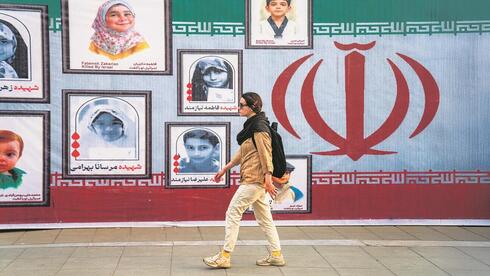When Israel began its offensive against Iran in June, confusion reigned. Those were fateful days — filled with fear, dread and a glimmer of hope. The regime appeared to crumble before people’s eyes as airstrikes targeted some of its most symbolic assets. Israeli warplanes made clear to ordinary Iranians that the authorities were powerless to protect them.
For 12 days, the country was gripped by panic. No one knew what to do. Some young people climbed to rooftops or upper floors, others crowded into tunnels and tried to celebrate — anything to cope with the helplessness.
4 View gallery
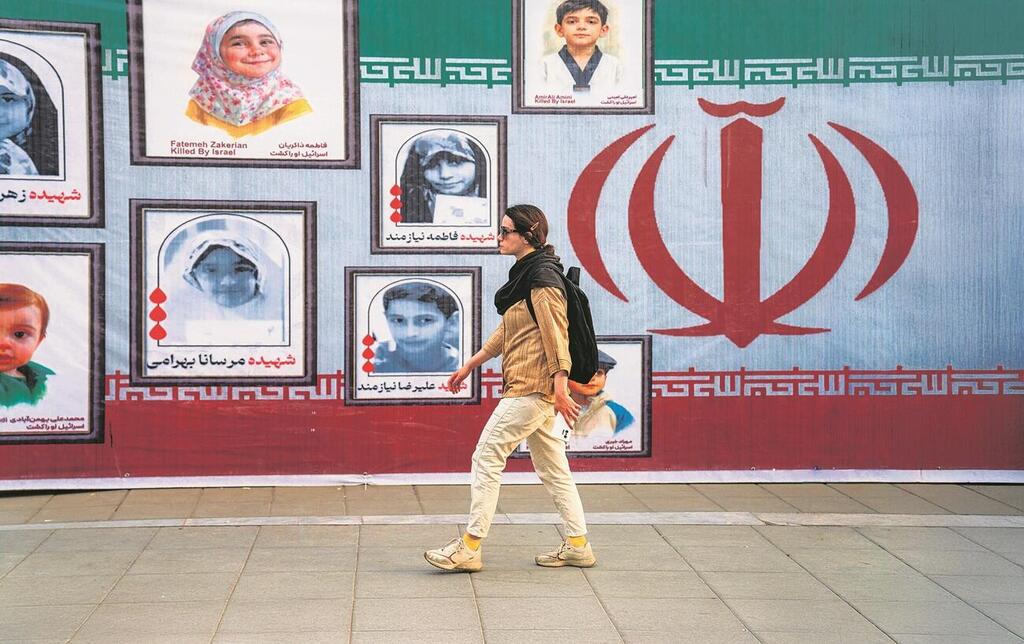

A woman walks without a headscarf on a street in Tehran
(Photo: Majid Saeedi/Getty Images)
Sensing an opportunity, the government unleashed nearly 50,000 police officers, soldiers and morality enforcers into the streets. Modesty patrols stopped caring about women’s headscarves; they were hunting spies. Men on motorbikes and in unmarked cars, armed with clubs, batons and brass knuckles, beat anyone they suspected of dissent.
In Tehran, most women now drive without covering their hair, and many no longer wear headscarves even on the street. Once, a phone warning or an arrest by police would have followed. Now, there is no time for such enforcement. Authorities are consumed by paranoia, trying to understand how Israel had penetrated their ranks so deeply.
The fear of airstrikes was eclipsed by fear of the streets. Anyone seen filming or recording was arrested. Hundreds are now imprisoned on suspicion of spying for Israel, and dozens have been executed since the war began. The bombings didn’t frighten us. On the contrary, they gave us hope. What terrified us was the violence in the streets — something we had never experienced. It didn’t end with the person arrested; it extended to their entire family.
At the start of Israel’s offensive, we dissidents were confused as well. Because while you may oppose the regime, you are still a patriot, and it breaks your heart when your country is bombed. On one hand, there is sympathy and even gratitude toward anyone who might help bring down the government. On the other, it is difficult to support, or even feel sympathy for, a force dropping bombs on your homeland and your own house.
Let me put it this way: we could have felt much more empathy for Israel’s actions here, and the way it exposed the regime’s weakness, were it not for what is happening in Gaza. Still, all of us in the opposition know this — even if Israel had carried out months of airstrikes, and far harsher ones at that, it would not match the number of people killed by the regime itself.
“In Tehran, most women now drive without covering their hair, and many no longer wear headscarves even on the street. Once, a phone warning or an arrest by police would have followed. Now, there is no time for such enforcement. Authorities are consumed by paranoia, trying to understand how Israel had penetrated their ranks so deeply.”
We all know who the real war is against. We cannot afford to be picky. We must accept help from anyone who offers it. People outside do not realize how many executions have taken place here since 2022. These are not public hangings, but summary killings carried out in the streets, without trial or oversight. Imagine a life where those meant to protect you are in fact your greatest enemy. Where you are afraid to step outside for fear of running into security forces. This is not a normal existence.
We had many conversations among ourselves during the war and after it. We came to understand that we face a challenge that the previous generation — those who fought against the regime before us — did not. They had known another reality, had something to compare to, had a model of freedom, liberalism and normal life without religious decrees. We have no such model. This reality is all we know. We must imagine our own vision for Iran’s future.
One thing that helps us now is the thousands who returned to Iran when the war began. Exiles who fled months or years ago chose to come back to show solidarity. They — and of course, social media — are helping us shape our vision for an Iran after clerical rule.
In the first nights after the Israeli strikes, when reports emerged about generals being killed, the opposition was euphoric. Then came the war itself, and now we are left to return to ordinary life. For us, that means figuring out how to take care of ourselves, how to muster the energy to bring down the regime on our own. We are strong people, but also deeply sad. We are willing to do anything to make sure our children never have to endure what we have endured as citizens. And we know the time is drawing near.
The national mood in Iran was unlike anything we had seen. For the first time in decades, we were attacked, and no one knew how the regime would respond. Even in the opposition, we had to shift our mindset. Instead of focusing on how to topple the government, we were focused on how to survive the night.
4 View gallery
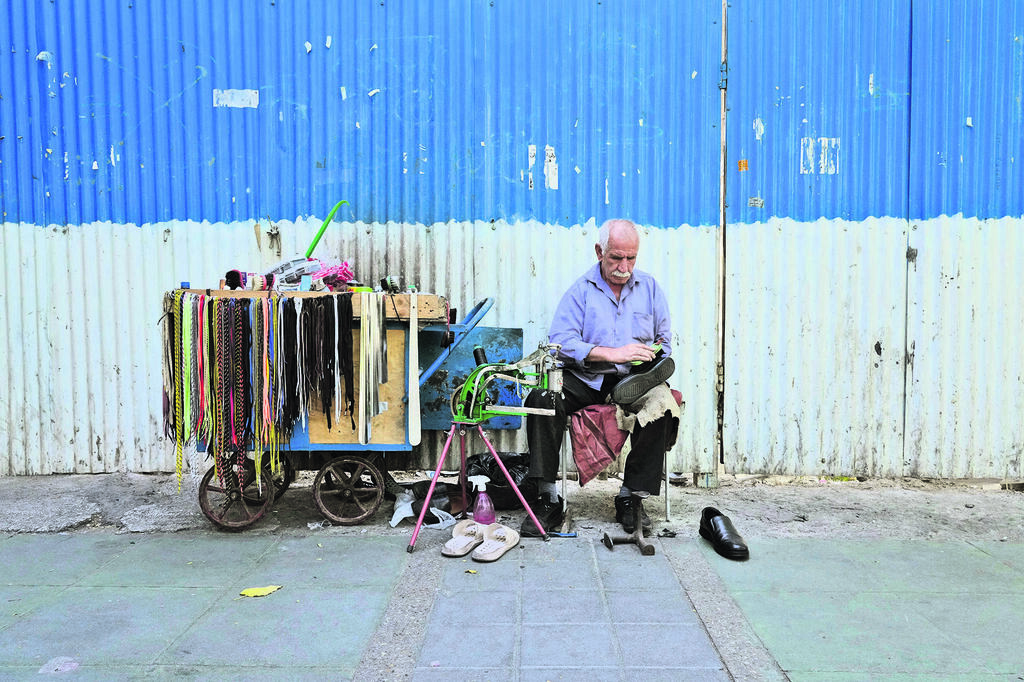

There is now a deep crisis of trust between citizens and the state. People suddenly realized how arbitrary it all was — that someone died simply because they lived in the same building as a senior general, and that it could just as easily have been their fate, not their neighbor’s. Anger is buried beneath the surface, and at some point, it must erupt. When it does, it will be huge, because since the war ended, the regime has been focused only on suppressing us.
At the moment, our belief in toppling the regime is close to zero. The government may have lost influence abroad, after what happened with Hezbollah and the collapse of Assad’s rule in Syria, but it has preserved and even strengthened its grip at home.
It must be remembered that wars, such as the one against Iraq, build myths in Iran. When there is unity against an external enemy, the regime can rally people in the name of patriotism. Many who now hold senior positions are veterans of the 1980s war with Iraq.
Alongside posters of that war — and of the current conflict — there are now banners across Tehran and the country showing families holding hands, above the slogan: “No one stands with us, we must stand with each other.” But most people are tired. They no longer want explanations and propaganda. They want to stop dying because a nuclear scientist happens to live downstairs. They want their air conditioners to work when the temperature outside is 40 degrees.
Optimism is at its lowest. We cling to hope, however faint, because it is all we have left. Some look to Britain, Germany and France, hoping they might impose new sanctions on Iran for violations of the nuclear deal. But if my generation has learned anything in recent decades, it is not to rely on outsiders for revolution — certainly not the West. Quality of life and democracy in Iran are nowhere near the top of their priorities.
So who will bring the revolution? Ironically, more and more of us believe it will be the regime itself.
4 View gallery
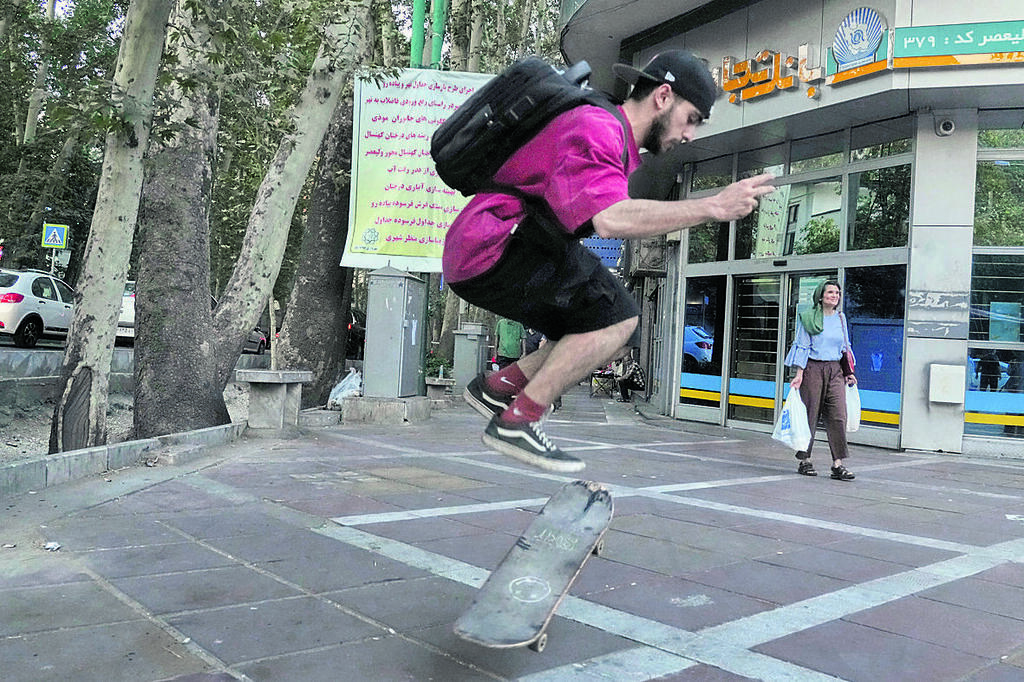

This past summer was hellish, with extreme heat and severe shortages of water and electricity. Taps ran dry, and for many hours each day there were blackouts, some of them deliberate. That reality forced people out of their homes — it was too hot without air conditioning — and into streets and public squares. And once people gathered, they began talking about how the state can no longer provide the most basic needs that any government must deliver. This was no longer a demand for press freedom or democratic elections. It was a demand for water and electricity.
From those gatherings — from the conversations and the despair — came small, tentative protests against the regime. They lacked momentum, but they were a beginning. This is also why the government is so invested in projecting that its nuclear program remains intact, preserving ambiguity that gives it power abroad and bolsters its grip at home.
Unsurprisingly, dissent has also found expression in cinema, which has long produced resistance against the regime against all odds. This year it was especially evident when Jafar Panahi won the Palme d’Or for his film It Was Just an Accident, a sharp critique of the authorities. The very fact he was allowed to travel to Cannes was a surprise.
Panahi also co-wrote the screenplay for a film about three generations of women dancers in a single family and their struggle to free themselves from violence and repression — both from the men in their lives and from female officials who enforce the regime’s rules. The closing scene, showing the women dancing as the names of women murdered for defying their husbands appear on screen, left a powerful impression on Iran’s women’s movement.
At the same time, an intensely underground play surfaced in Iran, telling the story of two lesbian women in tight bodysuits engaged in an intimate relationship. Had the actresses been caught, even though it was only a play, they could have faced a punishment of 100 lashes. Yet they performed anyway, undeterred — nor was their director. Amusingly, when the production toured in Western countries, the actresses covered their faces so they would not be recognized upon returning to Tehran’s airport.
4 View gallery
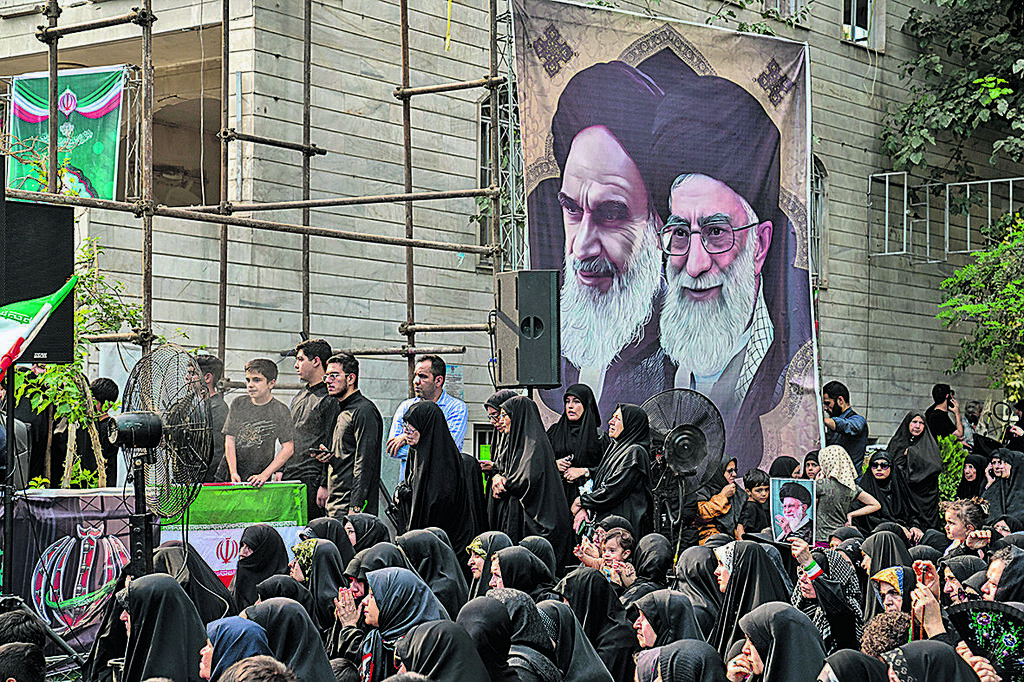

(Photo: Majid Saeedi/Getty Images)
In the air, especially among artists, there is a constant feeling — a drive to provoke, to paint the boundaries and then to break through them.
Iran did not win. Even Supreme Leader Ayatollah Ali Khamenei knows that the public noticed his absence from the funerals of slain generals, fearing Israeli airstrikes. Such things can no longer be hidden from the people. The regime’s message is simply that Iran survived — that it was attacked by the strongest military in the world and yet the system endured. From their perspective, that is victory.
It is also, in their eyes, a victory that Israel alone could not eliminate Iran and its nuclear program. A victory that Iran has resumed work on enrichment. No one is under the illusion that Iran would actually use an atomic bomb in a military strike. Even the most militant patriots understand that a nuclear attack would bring about Iran’s destruction. Everyone knows the country cannot secretly enrich uranium for military purposes or develop a bomb without detection.
The most important lesson of the 12-Day War is that Israeli intelligence operates freely inside Iran. Dozens of Israeli agents are on the ground, recruiting hundreds of locals. Their whereabouts, plans and activities are unknown. That is the reason behind the mass arrests and executions of people accused of spying for Israel. In many cases, there is no real evidence — it is a campaign of deterrence.
The regime now finds itself forced to negotiate over its nuclear program from a defensive position, something highly uncharacteristic. The idea that this vulnerability will make Tehran easier to pressure into concessions is naïve, failing to grasp the mindset of Iran’s leadership. More likely outcomes are deeper alignment with Russia and China, or a scenario in which the regime, feeling it has nothing left to lose, bets everything on a decisive strike against Israel. If Israel is seen as threatening the system or Khamenei’s own survival, the regime may lash out. Iran is not Hezbollah; it cannot quietly accept a direct hit on its leader.
“Authorities are desperate to erase the humiliation, the surrender, the loss of control. Official rhetoric remains anti-Israeli, anti-American and anti-Western, but it has shifted to emphasize nationalism more than religion. The regime is once again building the ‘us against the world’ narrative that has long served it well.”
It is widely known that Khamenei is preparing the ground for succession, though it is not spoken of publicly out of deference. Most expect his son to inherit the role. He is not considered a top-tier cleric, but then neither was Khamenei. On matters of power, the regime is pragmatic.
The prevailing mood in Tehran now is one of fear — quiet, simmering, laced with anger. The regime is working hard to erase any trace of the war. Murals of victims are painted alongside martyrs from both the recent conflict and the Iran-Iraq War, casting them as saints who died for the nation, obscuring the fact that many perished in their sleep, not in battle.
Authorities are desperate to erase the humiliation, the surrender, the loss of control. Official rhetoric remains anti-Israeli, anti-American and anti-Western, but it has shifted to emphasize nationalism more than religion. The regime is once again building the “us against the world” narrative that has long served it well.
How do people believe it? Because for 46 years, Iranians have been trained to keep their eyes down, suppress feelings and say black when they see white. Cemeteries here are called “Paradise.”
Postwar Tehran is a sad city, shrouded in what locals call “the dust of death.” The fighting lasted less than two weeks, but the psychological weight will linger much longer. Markets are empty, as are restaurants and cafés. People even miss the once-crushing traffic, the noise, the grime. Now, there is only grief. Many who fled the city have not returned. Those who remain are afraid to spend money. Layoffs are widespread, poverty and hunger are growing, and anxiety is pervasive. The regime boasts that its nuclear program survived largely intact, but for us that only means one thing: Israel knows the job is not finished.
Above all, there is expectation. We all know there will be another round. We just do not know when. We are waiting.

